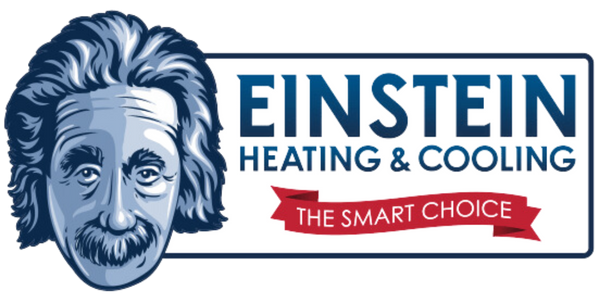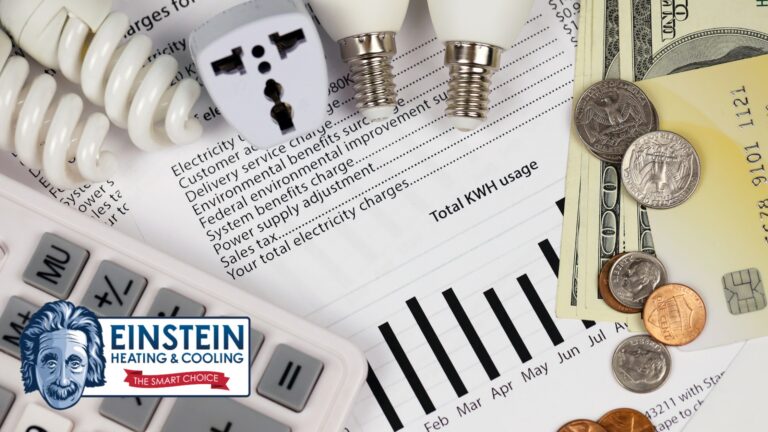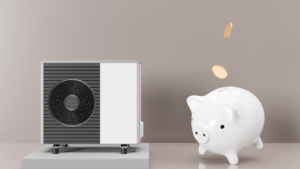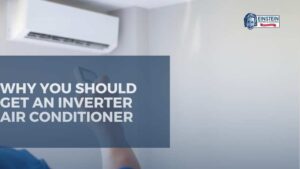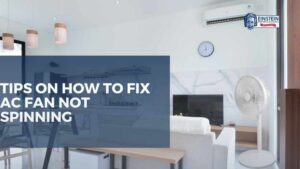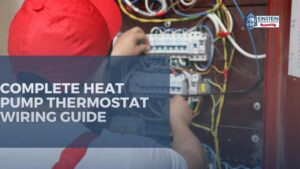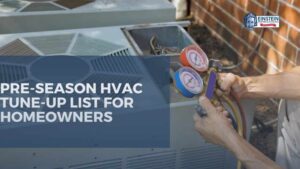Introduction
In today’s world, where energy conservation and cost efficiency are paramount, finding effective ways to reduce energy consumption and save money is crucial. One area where significant energy savings can be achieved is through efficient heating, ventilation, and air conditioning (HVAC) solutions. This blog focuses on Maricopa County, Arizona and explores various HVAC strategies and technologies that can help residents save energy and money while maintaining optimal comfort levels.
Understanding the Importance of Efficient HVAC Systems
Efficient HVAC (heating, ventilation, and air conditioning) systems play a vital role in residential energy consumption. Before exploring specific solutions, it is crucial to comprehend the significance of having an efficient HVAC system. By optimizing these systems, homeowners can reap multiple benefits, including reduced energy waste, decreased carbon footprint, and lower utility bills. Let’s delve deeper into the importance of efficient HVAC systems and the various ways to achieve energy efficiency.
Residential HVAC systems typically account for a significant portion of energy usage. Inefficient systems can lead to unnecessary energy consumption, resulting in higher energy bills and increased environmental impact. By improving the efficiency of HVAC systems, homeowners can minimize energy waste, conserve resources, and contribute to a greener planet.
One key approach to enhancing efficiency is through equipment upgrades. Outdated HVAC systems often lack the technological advancements found in newer models. Upgrading to energy-efficient units can yield substantial energy savings. These newer systems are designed to meet or exceed industry standards for energy efficiency. Features such as variable speed motors, high Seasonal Energy Efficiency Ratio (SEER) ratings, and smart controls help optimize energy usage.
In addition to equipment upgrades, the implementation of smart thermostats and programmable controls can significantly improve the HVAC unit. These devices allow homeowners to schedule temperature adjustments based on occupancy patterns. By reducing energy consumption during unoccupied periods or optimizing temperature settings based on residents’ needs, smart thermostats contribute to energy savings without compromising comfort.
Proper maintenance is another critical factor in achieving optimal HVAC efficiency. There are many tips on how to create a comfortable home using different heating and cooling systems in Arizona. Regularly cleaning or replacing air filters, inspecting ductwork for leaks, and checking refrigerant levels are essential maintenance tasks that ensure the system operates at peak performance. Scheduling professional tune-ups annually can identify and address any underlying issues, preventing energy waste and potential breakdowns.
Strategic energy management and conservation strategies complement equipment upgrades and maintenance. By sealing air leaks in windows and doors, insulating attics and walls, utilizing natural ventilation, and minimizing heat gain from sunlight, homeowners can further optimize energy usage. Encouraging residents to practice energy-conscious habits, such as turning off lights and appliances when not in use, also contributes to overall energy savings.
Understanding the importance of efficient HVAC systems is paramount for homeowners seeking to save energy and reduce costs. By implementing equipment upgrades, utilizing smart thermostats, performing regular maintenance, and adopting energy management strategies, homeowners can achieve significant energy savings while maintaining optimal comfort levels. Moreover, the environmental benefits of efficient HVAC systems contribute to a greener and more sustainable future.
Equipment Upgrades for Energy Efficiency
One effective approach to achieving energy efficiency in HVAC (heating, ventilation, and air conditioning) systems is through equipment upgrades. Replacing outdated HVAC equipment with energy-efficient models can lead to significant energy savings, lower utility bills, and reduced environmental impact. Let’s explore the importance of equipment upgrades and the features to consider when seeking energy-efficient options.
Newer HVAC systems are specifically designed to meet or exceed industry standards for energy efficiency. They incorporate advanced technologies and features that optimize energy consumption without compromising comfort levels. Upgrading to these energy-efficient models can result in substantial energy savings over the long term.
Variable speed motors are one important feature to consider when upgrading HVAC equipment. Unlike traditional single-speed motors, variable speed motors can adjust their operation based on the specific heating or cooling requirements of the space. By running at lower speeds when less heating or cooling is needed, these motors consume less energy, leading to significant efficiency improvements.
Another feature to focus on is the Seasonal Energy Efficiency Ratio (SEER) rating. SEER measures the cooling output of an air conditioner or heat pump relative to the energy it consumes. Higher SEER ratings indicate greater energy efficiency. Upgrading to units with higher SEER ratings ensures that cooling needs are met while minimizing energy waste.
Smart controls and thermostats are additional elements to consider when upgrading HVAC systems. These devices offer advanced programming and connectivity features that enable homeowners to optimize temperature settings based on occupancy patterns. By adjusting temperatures when the space is unoccupied or tailoring settings to residents’ preferences, smart controls contribute to energy savings and increased efficiency.
Regular maintenance and upkeep are essential for preserving HVAC efficiency. Replacing air filters at recommended intervals is a simple yet crucial maintenance task. Clean air filters ensure optimal airflow, allowing the system to operate efficiently and reducing the strain on the equipment.
Equipment upgrades are a fundamental step towards achieving energy efficiency in HVAC systems. By replacing outdated equipment with energy-efficient models featuring variable speed motors, high SEER ratings, and smart controls, homeowners can significantly reduce energy consumption and lower their utility bills. Additionally, regular air filter replacements help maintain optimal system performance. Investing in energy-efficient HVAC equipment not only benefits homeowners financially but also contributes to a more sustainable and environmentally friendly future.
Smart Thermostats and Programmable Controls
Smart thermostats and programmable controls are valuable tools for achieving energy efficiency in HVAC systems. By installing these devices, homeowners gain the ability to optimize their HVAC system’s operation based on their specific schedule and preferences.
One of the key benefits of smart thermostats and programmable controls is the ability to adjust temperature settings based on occupancy patterns. Homeowners can program the thermostat to automatically lower or raise the temperature when the house is unoccupied, reducing energy consumption during those times. This feature ensures that energy is not wasted on heating or cooling an empty space.
Furthermore, smart thermostats and programmable controls allow homeowners to maintain optimal comfort levels when they are present. They can set the thermostat to adjust the temperature before they arrive home, ensuring a comfortable environment upon their arrival. This personalized control over temperature settings helps minimize energy waste while still providing the desired comfort.
Remote access via smartphones adds an extra layer of convenience and control. Homeowners can access their smart thermostat remotely, allowing them to make adjustments even when they are not physically at home. This feature is particularly useful for situations when schedules change unexpectedly, or when adjustments are needed while away from home. By having remote access, homeowners can ensure energy efficiency and comfort no matter where they are.
In conclusion, smart thermostats and programmable controls offer homeowners the flexibility to optimize their HVAC system’s operation according to their schedule and preferences. The ability to adjust temperature settings based on occupancy patterns, along with remote access via smartphones, enhances control and energy management capabilities. By utilizing these devices, homeowners can achieve significant energy savings while maintaining optimal comfort levels in their homes.
Proper Maintenance and System Optimization
Proper maintenance and system optimization are essential for maximizing the efficiency and lifespan of HVAC (heating, ventilation, and air conditioning) systems. Regular maintenance tasks and professional tune-ups can significantly improve system performance and prevent energy waste.
One crucial maintenance task is cleaning or replacing air filters. Over time, air filters can become clogged with dust, debris, and pollutants, obstructing airflow and reducing system efficiency. Regularly cleaning or replacing air filters ensures proper airflow and allows the system to operate at its optimal level, saving energy in the process.
Inspecting ductwork for leaks is another important maintenance step. Leaky ducts can result in air leakage, causing energy loss and reducing the effectiveness of heating and cooling. Identifying and sealing these leaks can significantly improve system efficiency and reduce energy waste.
Checking refrigerant levels is crucial for systems that utilize refrigerant for cooling. Insufficient or excessive refrigerant levels can lead to inefficient operation and increased energy consumption. Ensuring that refrigerant levels are within the manufacturer’s recommended range can optimize system performance and energy efficiency.
Scheduling professional tune-ups on an annual basis is highly recommended. HVAC professionals have the expertise to thoroughly inspect the system, identify any underlying issues, and address them promptly. They can calibrate settings, clean components, lubricate moving parts, and perform necessary adjustments to optimize system performance. By addressing any inefficiencies or malfunctions, professional tune-ups prevent energy waste and potential breakdowns, ultimately extending the lifespan of the HVAC system.
Proper maintenance and system optimization are crucial for maximizing the efficiency and longevity of HVAC systems. Regular cleaning or replacement of air filters, inspection and sealing of ductwork, checking refrigerant levels, and scheduling professional tune-ups contribute to improved system performance, energy efficiency, and cost savings. By investing in regular maintenance, homeowners can ensure that their HVAC systems operate at their best, resulting in optimized energy usage and enhanced comfort in their homes.
Energy Management and Conservation Strategies:
Energy management and conservation strategies are essential for maximizing efficiency and reducing energy consumption in HVAC systems. These strategies go beyond equipment upgrades and maintenance and focus on optimizing energy usage in various ways.
Sealing air leaks in windows and doors is a simple yet effective measure. Air leaks allow for the exchange of indoor and outdoor air, resulting in energy loss and reduced efficiency. By properly sealing these leaks, homeowners can prevent air infiltration and maintain a more stable indoor temperature, reducing the workload on the HVAC system.
Insulating attics and walls helps to minimize heat transfer between the interior and exterior of a home. Proper insulation acts as a barrier, reducing the need for excessive heating or cooling. This results in lower energy consumption and improved efficiency in HVAC operation.
When weather permits, utilizing natural ventilation can significantly reduce the need for mechanical cooling or heating. Opening windows or using fans to circulate fresh air can provide a natural and energy-efficient way to maintain comfortable indoor conditions.
Minimizing heat gain from sunlight is another effective strategy. Installing shading devices such as blinds, curtains, or awnings can block direct sunlight from entering the space, reducing the cooling load on the HVAC system. Reflective window treatments can also help to bounce back heat and keep the interior cooler.
Encouraging residents to be mindful of their energy usage is important. Simple habits such as turning off lights and appliances when not in use can lead to significant energy savings. Additionally, promoting energy-conscious behaviors such as using energy-efficient lighting and appliances can further contribute to overall energy efficiency.
Wnergy management and conservation strategies are crucial for optimizing efficiency and reducing energy consumption in HVAC systems. Sealing air leaks, insulating, utilizing natural ventilation, minimizing heat gain, and promoting energy-conscious habits all play a role in maximizing energy efficiency. By implementing these strategies, homeowners can achieve significant energy savings, reduce their carbon footprint, and contribute to a more sustainable future.
Conclusion
In conclusion, efficient HVAC solutions are paramount for homeowners in the 85008 area code to save energy and money. By implementing equipment upgrades, utilizing smart thermostats, performing regular maintenance, and adopting energy management strategies, residents can achieve substantial energy savings while ensuring optimal comfort levels in their homes.
Equipment upgrades, such as replacing outdated HVAC systems with energy-efficient models, can result in significant energy savings over time. Features like variable speed motors, high SEER ratings, and smart controls optimize energy consumption without compromising comfort. Smart thermostats and programmable controls allow homeowners to adjust temperature settings based on occupancy patterns, saving energy when the house is unoccupied and maintaining comfort when residents are present. Regular maintenance tasks, including cleaning or replacing air filters and inspecting ductwork for leaks, improve system performance and prevent energy waste.
Furthermore, embracing energy management strategies like sealing air leaks, insulating attics and walls, and minimizing heat gain from sunlight contributes to overall energy efficiency. Encouraging energy-conscious habits, such as turning off lights and appliances when not in use, further enhances energy savings.
Consulting with HVAC professionals who can assess individual needs and recommend tailored solutions is essential. They can provide expert advice on equipment upgrades, system optimization, and energy management techniques specific to the 85008 area code.
By embracing these energy-efficient practices, homeowners in the 85008 area code can make a positive impact on the environment by reducing their carbon footprint. Moreover, they can enjoy long-term financial benefits through lower utility bills and enhanced energy savings.
In summary, saving energy and money through efficient HVAC solutions is within reach for homeowners in the 85008 area code. By implementing equipment upgrades, smart thermostats, regular maintenance, and energy management strategies, residents can optimize their HVAC systems, reduce energy consumption, and enjoy the financial and environmental benefits that come with it.
